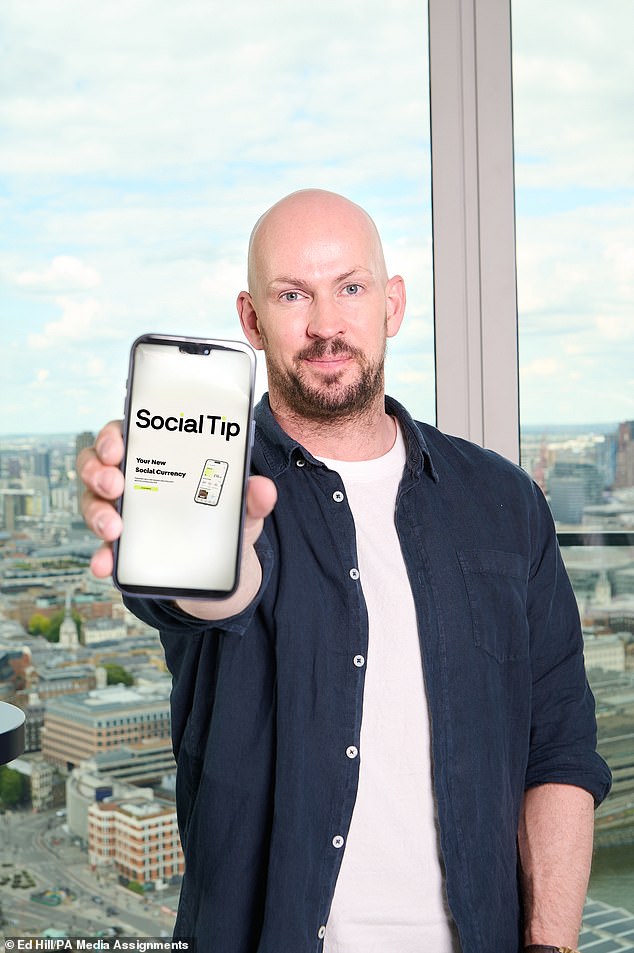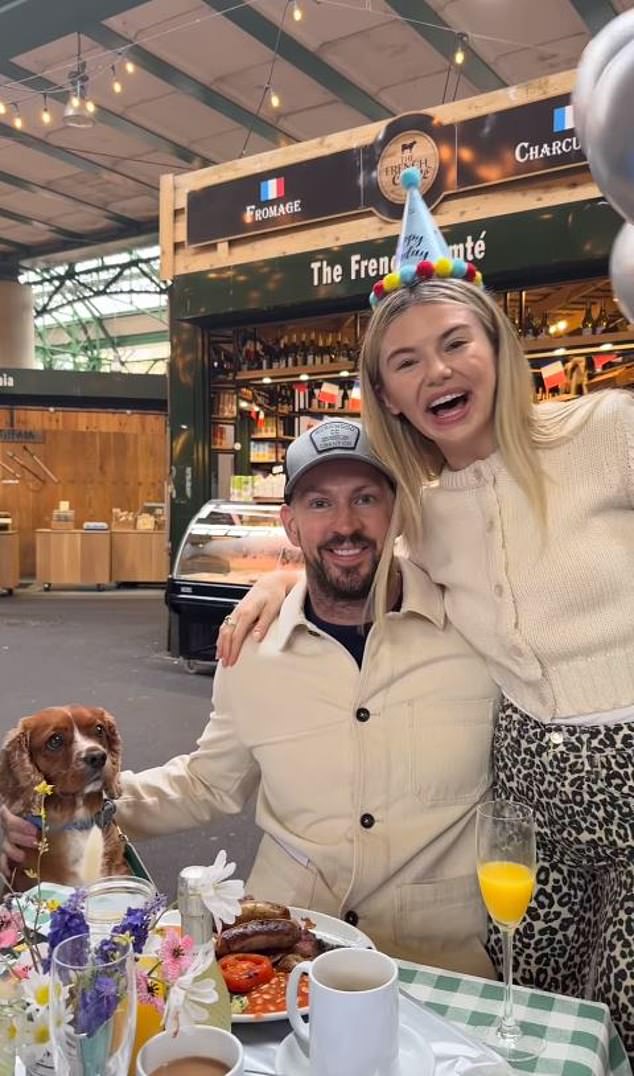How Georgia Toffolo’s BrewDog founder thinks he can turn YOU into an influencer, just like her
Georgia Toffolo’s career as an ‘influencer’ – earning thousands of pounds from a single photo or video on Facebook, Instagram or TikTok – is a fantasy for most people.
‘Toff’, 29, is the envy of many who want to give up their boring job for a life of glamour.
Now her boyfriend James Watt, the 42-year-old founder of craft beer giant BrewDog, is claiming he can also turn ordinary people into influencers if they sign up to promote products through his new venture, Social Tip.
But could anyone – even an ordinary person like me – really become the new Toff?
I came to meet the couple to find out.
Georgia Toffolo, 29, with boyfriend James Watt, 42, founder of craft beer giant BrewDog
They sleep in a stunning, Instagram-tastic London apartment, so high above the Thames that the City’s skyscrapers look like miniature models. There’s an ice bath — part of Watt’s morning routine, he says — on the balcony.
Not that I fancy a morning slump in the freezing cold, but if I sign up for Social Tip I might just get my own multi-million pound penthouse.
I have to admit, Toff has a head start as an influencer. She’s chic, articulate, beautiful and well-connected – all valuable qualities in the fiercely competitive sphere of social influence. The enviable apartment serves as the backdrop for many of her posts, which is no bad thing.
She starred in the reality series Made in Chelsea and won I’m a Celebrity… Get Me Out of Here! in 2017.

Watt claims he can turn regular people into influencers if they sign up to promote products on his new venture Social Tip
She has written an autobiography and four novels and has 1.8 million followers on Instagram. Her posts are sponsored by fast-fashion group Shein and L’Oreal, among others.
In other words, she belongs to a small elite group of “mega-influencers” who have more than a million fans on social media.
Boyfriend Watt is a self-made tycoon, albeit a controversial one. Is his business acumen combined with her first-hand experience a recipe for success with Social Tip?
Watt stepped down as CEO of BrewDog in May, having co-founded the company and built it into one of the UK’s top beer brands, largely through clever branding. He will remain on the board as a non-executive director and advisor.
He positioned BrewDog as a ‘punk’ label, in contrast to the big corporate brewers such as Heineken. However, that rebellious image began to fray when accusations of bullying were made against him by employees.
Still, he emerged with a sizeable fortune, estimated at £260 million. And his new venture, if all goes to plan, could be a heady cocktail of his branding flair and her uber-influencer status.
Watt says he had the idea for Social Tip when the two went on a blind date a year ago. He says he learned from her how much work it takes to be successful.
As if to underline her point, the cheerful and upbeat Toff spends much of my visit with her colleagues at a recruitment agency she founded in 2020.
She pauses her work for a moment and says that she thought Social Tip was a great idea when he mentioned it and she wants to contribute to it.
‘Because if there’s anyone who can judge these kinds of companies from above, it’s me. I have a very unique perspective.’
For those who are not yet familiar with the mysterious world of the influencer: how does Social Tip actually work?
It’s not up and running yet, but the idea is that users download the app to their phones and post messages talking about companies and products. If this leads others to buy, the companies they promote pay them a fee.
Social Tip has already linked up with Instagram and Twitter, and a partnership with Facebook is in the works. Watt says he has signed up around 170 companies, including BrewDog, PureGym and bar chain Slug & Lettuce.
Companies have requirements for the content of the posts. For example, a manufacturer of Wellington boots may require photos to be taken of a customer wearing their boots in a field. The muddier the better.
It’s easy to see the potential appeal of Social Tip for businesses that sign up. They receive reams of data about their customers and the types of photos and videos that appeal to potential buyers.
It is more difficult to determine a reward for potential influencers.

Toff starred in the reality TV hit Made in Chelsea and was the winner of I’m a Celebrity… Get Me Out of Here! in 2017
For starters, they probably make very little money. Payments are determined by a formula based on how many likes, views, and comments each post gets.
The chances of candidates signing up for Social Tip ever getting anywhere near Toff are slim, as they can earn a maximum of 10 percent of the price of the products they promote.
Social Tip takes a separate cut of the proceeds, which the company hopes to use to make money.
So if I posted about a brilliant meal that cost £110, the most I could get paid is £11. It’s not clear at the moment how hard it would be to reach the maximum, as the criteria remain vague.
But I got the impression that people would only get the highest payout if their photo or video went viral.
Companies will also likely limit the number of times influencers can post about them on Social Tip per year (Social Tip’s recommended number is four). That will likely also limit their monetization potential.
To be fair, Watt isn’t promising that you and I will become the new Toff: he’s pitching Social Tip as a platform for influential people to talk to their own social circles.
He argues that when people who really love a company’s products tell their friends about it, it has a bigger impact than mega-influencers like Toff. Authenticity, he says, is key.
But wait a minute – is he saying that Toff, his own girlfriend, is not authentic? He seems to have come dangerously close.
“When I talk about the demise of (mega) influencers all day, I’m basically saying… sorry honey, I’ll make dinner tonight,” he says regretfully.

Watt says he had the idea for Social Tip when he was set up on a blind date with Toff a year ago
Toff isn’t offended. Watts’ criticism, she says, is aimed at other big influencers who are just selling products, not at her.
‘I pride myself on having a fair amount of integrity when it comes to my public social media accounts. I’ve never collaborated with brands that I don’t use.’ Watt doesn’t see his past troubles at BrewDog as a barrier to success with Social Tip.
The entrepreneur, who has been diagnosed with autism and ADHD, has publicly apologised for allegations of a bullying culture at BrewDog.
He was also accused of inappropriate behavior that made female colleagues feel uncomfortable. In response, he said he “truly apologized” to anyone he made uncomfortable, but denied any “inappropriate” behavior.
‘A lot of things have been taken out of context. Were we perfect? No. Is there an employer in the UK that is perfect? No. I don’t think so.’
BrewDog is now worth an estimated £1.6 billion. Watt says he is not trying to emulate its success.
The cost of setting up Social Tip was, by his standards, low: he invested £1m of his own money and raised more through crowdfunding.
‘There will only be one BrewDog.’
My verdict: The person who probably makes the most money from Social Tip is probably Watt himself.
As one half of a power couple with Toff, he could do well, as could the companies that sign up.
But the chance that you or I will earn millions as an influencer, via Social Tip or otherwise, is small.
My advice to all wannabe Toffs is simple: don’t quit your job.
Some links in this article may be affiliate links. If you click on them, we may earn a small commission. That helps us fund This Is Money and keep it free. We do not write articles to promote products. We do not allow commercial relationships to influence our editorial independence.
